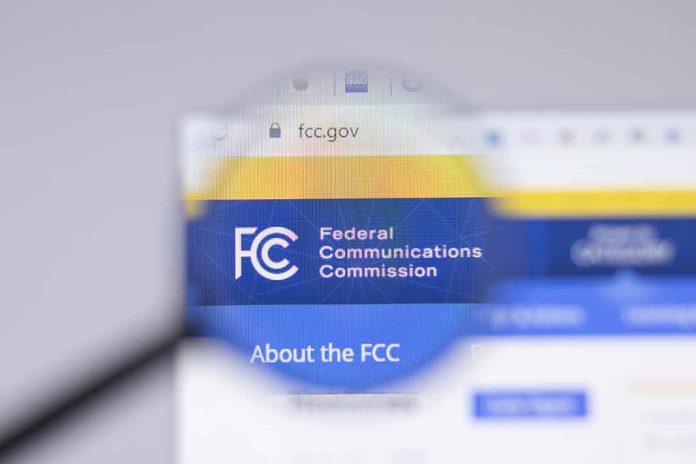
President-elect Donald Trump has selected Brendan Carr, a leading Republican on the Federal Communications Commission (FCC), to chair the agency, signaling a potential shift in telecommunications policy and regulation.
At a Glance
- Trump picks Brendan Carr as next FCC chair, praising him as a “warrior for Free Speech.”
- Carr plans to end the FCC’s focus on diversity, equity, and inclusion (DEI).
- He aims to dismantle what he calls a “censorship cartel” amid claims of anti-Republican bias from big tech companies.
- Carr opposes the reinstatement of net neutrality rules and advocates for broader FCC oversight of major tech companies.
- He has been critical of Chinese telecom companies and supports a hard line on China.
Trump’s Choice for FCC Leadership
President-elect Donald Trump has announced his selection of Brendan Carr to lead the Federal Communications Commission (FCC), a move that could significantly impact the regulatory landscape for telecommunications and technology companies. Carr, who has been serving as an FCC commissioner since 2017, is known for his strong stance against big tech and his criticism of the Biden administration’s telecom policies.
Trump’s decision to appoint Carr as FCC chair comes with high praise for the commissioner’s track record. The former president lauded Carr’s commitment to free speech and his efforts to combat regulatory measures that Trump believes have hindered economic growth and innovation.
“Commissioner Carr is a warrior for free speech and has fought against the regulatory lawfare that has stifled Americans’ freedoms and held back our economy. He will end the regulatory onslaught that has been crippling America’s job creators and innovators and ensure that the FCC delivers for rural America.” – Trump
Carr’s Vision for the FCC
As the incoming FCC chair, Carr has outlined several key priorities that could reshape the agency’s focus and approach to regulation. One of his primary objectives is to end what he perceives as a “censorship cartel” involving tech companies and government entities. Carr has been vocal about his concerns regarding alleged anti-Republican bias from major tech platforms and has demanded information from tech CEOs about their content moderation practices.
“We must dismantle the censorship cartel and restore free speech rights for everyday Americans.” – Brendan Carr
Carr also plans to shift the FCC’s focus away from diversity, equity, and inclusion (DEI) initiatives. Instead, he aims to eliminate regulatory barriers for job creators and innovators, with a particular emphasis on supporting rural areas. This change in direction aligns with Trump’s broader agenda of reducing government regulations and promoting economic growth.
Expanding FCC Oversight and Challenging Big Tech
One of Carr’s most ambitious proposals is to expand the FCC’s role to include oversight of major tech companies such as Google and Apple. This move would represent a significant shift in the agency’s traditional scope, which has primarily focused on telecommunications and broadcast media. Carr argues that this expanded authority is necessary to address issues of free speech and fair competition in the digital age.
In line with this goal, Carr has suggested limiting Section 230 of the Communications Decency Act, which provides liability protections for online platforms. He believes that modifying this provision could help address perceived viewpoint discrimination by tech companies. However, this proposal has drawn criticism from some industry observers who fear it could lead to increased censorship.
Net Neutrality and Broadband Infrastructure
Carr’s appointment could also impact ongoing debates about net neutrality and broadband infrastructure. He has consistently opposed the reinstatement of net neutrality rules, which were repealed during Trump’s first term. This position sets the stage for potential conflicts with advocates who argue that such regulations are necessary to ensure fair access to the internet.
Additionally, Carr has been critical of the FCC’s decision not to finalize $900 million in broadband subsidies for SpaceX’s Starlink satellite internet service. He viewed this decision as “regulatory lawfare” against Elon Musk, who is set to lead the new Department of Government Efficiency under Trump’s administration. This stance suggests that Carr may push for policies that favor private sector involvement in expanding broadband access, particularly in rural areas.
A Strong Stance on China
Carr’s appointment also signals a continuation of the Trump administration’s tough approach to China in the telecommunications sector. As the first FCC commissioner to visit Taiwan, Carr has advocated for a hard line on Chinese telecom companies, citing national security concerns. This position aligns with broader efforts to limit the influence of Chinese technology firms in U.S. communications infrastructure.
As Brendan Carr prepares to take the helm at the FCC, his appointment promises to usher in a new era of telecommunications policy. With a focus on free speech, deregulation, and challenging big tech, Carr’s leadership is likely to have far-reaching implications for the industry and consumers alike. The coming months will reveal how these policy priorities translate into concrete actions and regulations under the new FCC chair.
Sources:
- Brendan Carr Outlines His First Targets After Trump FCC Pick
- Trump picks Big Tech critic who wrote ‘Project 2025’ chapter to lead FCC
- Trump taps Musk-allied big tech critic Brendan Carr to head FCC
- Trump nominates big tech critic Brendan Carr to chair telecommunications regulator







